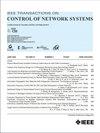Distributed Time-Varying Constrained Convex Optimization: Finite-Time/Fixed-Time Convergence
IF 4
3区 计算机科学
Q2 AUTOMATION & CONTROL SYSTEMS
引用次数: 0
Abstract
This article investigates a distributed time-varying optimization problem with inequality constraints, aiming to find finite-time and fixed-time convergent solutions free from initialization. A nonsmooth optimization algorithm for state consensus achieving within a finite or fixed time is presented by designing a projection-based log-barrier penalty cost function to meet the constraints and introducing integral sliding mode subsystems to guarantee zero-gradient-sum. With the use of the projection idea, the penalized functions are always well defined (i.e., satisfying the logarithmic definition) for any system states, which avoids initializing of certain parameters. An adaptive gain scheme without any extra global information is presented. The time-varying zero-gradient-sum method here is feasible for cost functions with nonidentical Hessian matrixes, and applicable to finite-time or fixed-time optimal consensus tracking. The effectiveness and superiority of our algorithms are verified with numerical simulations.分布式时变约束凸优化:有限时间/固定时间收敛
本文研究了一类具有不等式约束的分布式时变优化问题,旨在寻找不需要初始化的有限时间和固定时间收敛解。通过设计基于投影的对数障碍惩罚代价函数来满足约束条件,并引入积分滑模子系统来保证零梯度和,提出了在有限或固定时间内达到状态一致性的非光滑优化算法。利用投影思想,对于任何系统状态,惩罚函数总是定义良好(即满足对数定义),从而避免了某些参数的初始化。提出了一种不需要额外全局信息的自适应增益方案。本文提出的时变零梯度和方法对于具有非相同Hessian矩阵的代价函数是可行的,并且适用于有限时间或固定时间的最优一致性跟踪。通过数值仿真验证了算法的有效性和优越性。
本文章由计算机程序翻译,如有差异,请以英文原文为准。
求助全文
约1分钟内获得全文
求助全文
来源期刊

IEEE Transactions on Control of Network Systems
Mathematics-Control and Optimization
CiteScore
7.80
自引率
7.10%
发文量
169
期刊介绍:
The IEEE Transactions on Control of Network Systems is committed to the timely publication of high-impact papers at the intersection of control systems and network science. In particular, the journal addresses research on the analysis, design and implementation of networked control systems, as well as control over networks. Relevant work includes the full spectrum from basic research on control systems to the design of engineering solutions for automatic control of, and over, networks. The topics covered by this journal include: Coordinated control and estimation over networks, Control and computation over sensor networks, Control under communication constraints, Control and performance analysis issues that arise in the dynamics of networks used in application areas such as communications, computers, transportation, manufacturing, Web ranking and aggregation, social networks, biology, power systems, economics, Synchronization of activities across a controlled network, Stability analysis of controlled networks, Analysis of networks as hybrid dynamical systems.
 求助内容:
求助内容: 应助结果提醒方式:
应助结果提醒方式:


